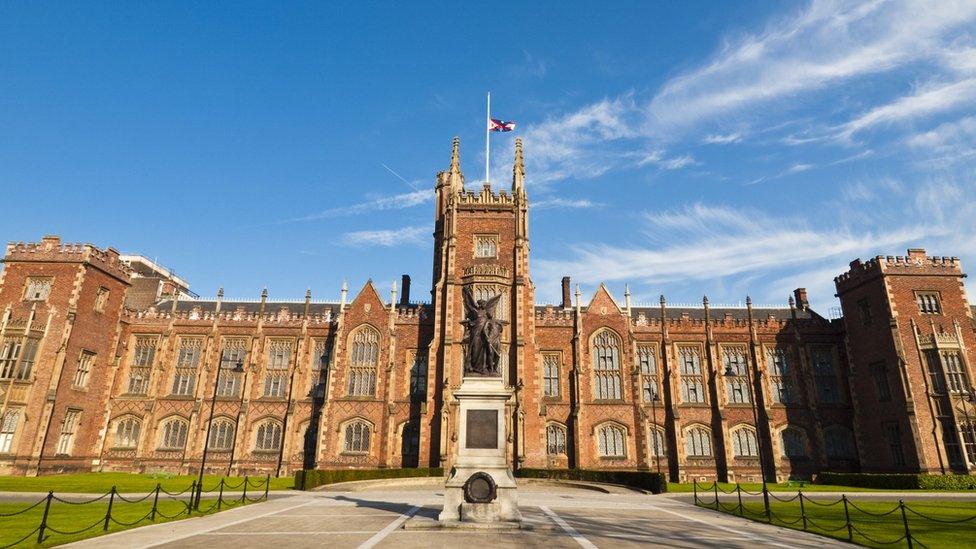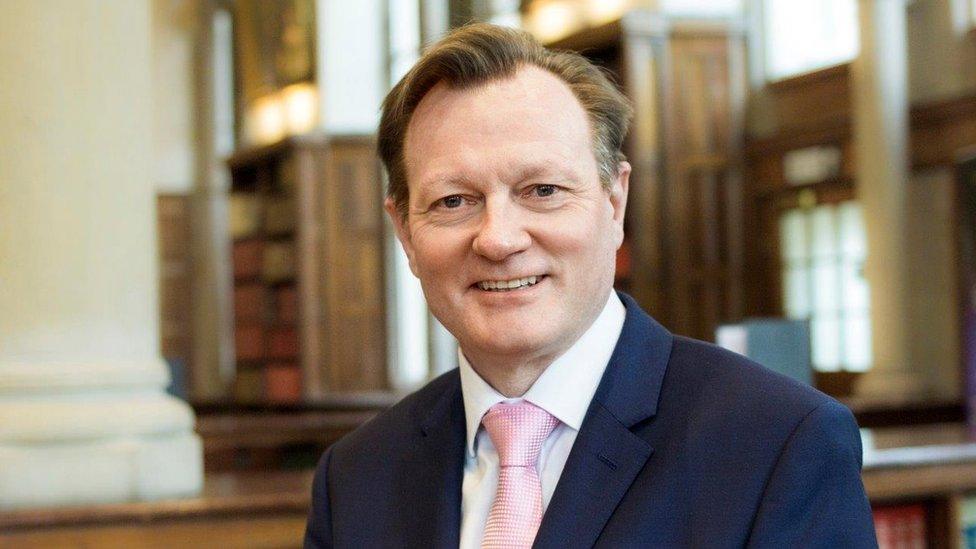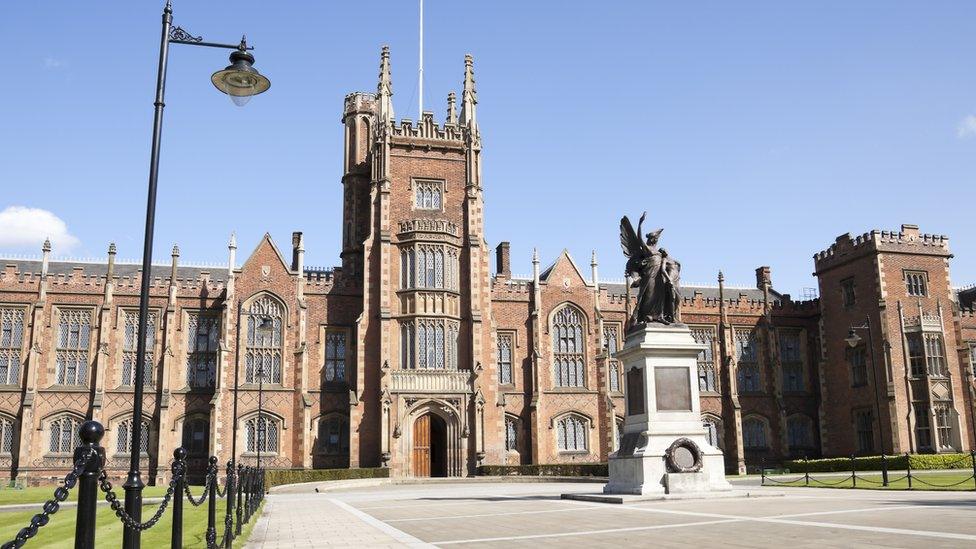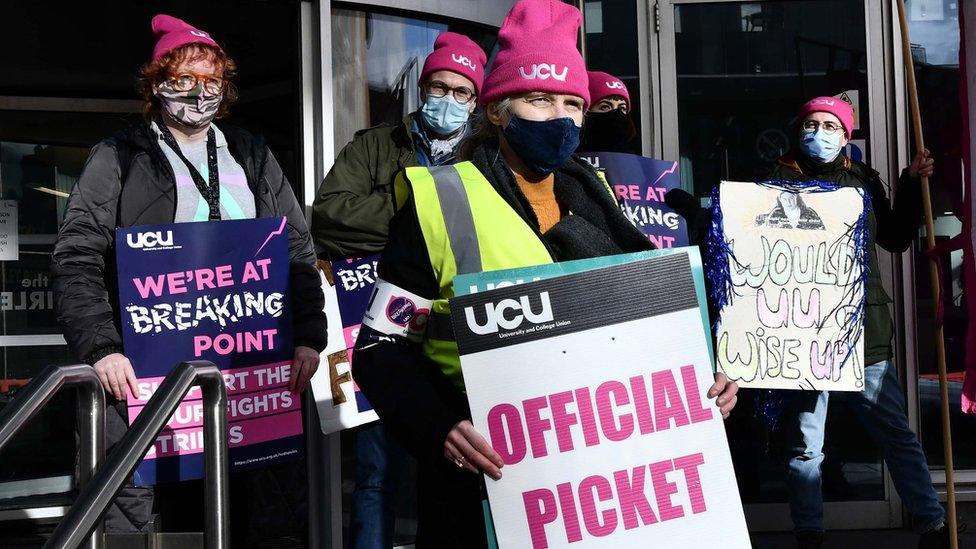Queen's University Belfast international students up by 20%
- Published

Income from international students' tuition fees has risen to £57m
The number of international students at Queen's University Belfast (QUB) has risen by almost 20% in just a year.
There are now 4,200 international students studying at the university.
The income the university receives from them in tuition fees also went up to almost £57m in 2021-22, a rise of £7m on the previous year.
QUB received £66m in tuition fees from full-time students from Northern Ireland, the Republic of Ireland and the UK.
The figures are contained in the university's just published annual report and accounts for 2021-22.
QUB's total income rose to about £437m - up from £400m in 2020-21 - but its operating costs also rose to £422m.
'A perfect storm'
The university's main sources of income are tuition fees, Stormont funding and income from research grants for specific projects.
But QUB vice-chancellor Prof Ian Greer warned a lack of government investment and student places risked a perfect storm that must be tackled urgently.
His comments were contained in the introduction to the annual report, which said QUB was facing significant risk due to "economic and political uncertainty, inflationary cost and utility pressures".
It also said that QUB and Ulster University (UU) would need an extra 5,000 places for Northern Ireland students by 2030, due to a projected rise in the number of 18 and 19 year olds.
While QUB received about £110m in Stormont funding in 2021-22, some of that was as a result of increased funding during the Covid-19 pandemic, which is due to come to an end.
The university recently warned it could cut hundreds of places for Northern Irish students if its funding from Stormont was reduced.
According to previous statistics from the Department for the Economy (DfE), more than 16,000 students from Northern Ireland are in higher education elsewhere in the UK.
'Economic handbrake'
The number of full-time undergraduate students at QUB and Ulster University can admit is capped by DfE depending on available funding.
MPs on the House of Commons Northern Ireland Affairs Committee (NIAC) recently said that cap acted as an "economic handbrake".
But former Economy Minister Gordon Lyons had previously warned increasing the number of university places would mean higher tuition fees or taking money from other Stormont departments.
Higher international fees
According to its annual report for 2021-22, QUB has about 25,000 students from 96 countries, and more than 4,300 members of staff from 98 countries.
The university opened a new £41m students' union in September.
Undergraduate students in Northern Ireland currently pay £4,630 a year in tuition fees, compared to £9,250 elsewhere in the UK.

QUB vice-chancellor Prof Ian Greer earned £315,000 in 2021-22
But international students typically pay much higher fees, starting at over £18,000 a year.
The 4,200 international students at QUB paid a total of almost £57m in tuition fees in 2021-22, up from just under £50m in 2020-21.
As well as £66m in fees from full-time Northern Ireland, UK and Irish students, the university's income also included part-time fees and over £17m from the Department of Health towards nursing courses.
That took QUB's total income from tuition fees up to £152m in 2021-22 from £143m the previous year.
The university also increased income from research grants by £10m to over £98m and other income from things like the use of the university's facilities also rose.
High salaries revealed
The university's investment policy included a "commitment to transfer its indirect investment into funds which exclude companies involved in the extraction and production of fossil fuels, by 2025, provided that the effect is not materially detrimental to expected investment returns", said the annual report.
The university originally made the change in investment policy on fossil fuels following protests by some students.
The annual report reveals that vice-chancellor Prof Greer earned £315,000 in 2021-22, a rise of £9,000 on the previous year.
In a separate statement to BBC News NI a university spokesperson said that: "The vice-chancellor's salary is determined, in line with the guidance issued by the committee of university chairs, by the university's remuneration committee, a sub-committee of its governing body, Senate."
Fifty-five other members of the university's 4,344 staff also earned more than £100,000.
Some staff from the University and College Union (UCU) at QUB and other universities have recently taken strike action in an ongoing dispute over pay, workload and pensions.
Related topics
- Published14 December 2022

- Published24 November 2022
